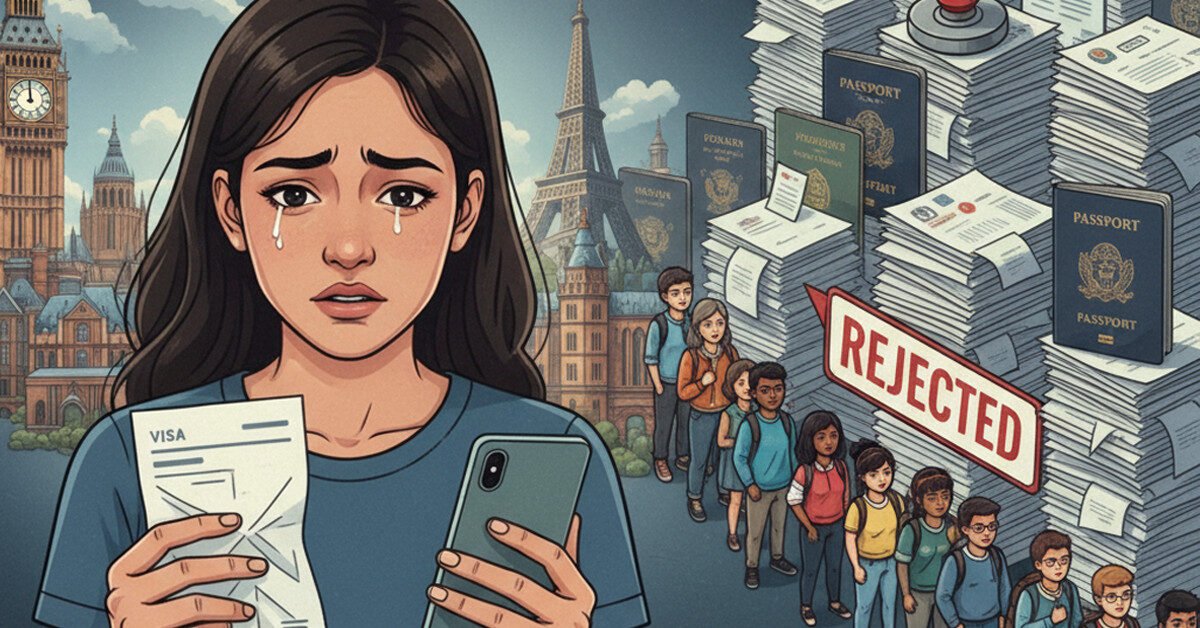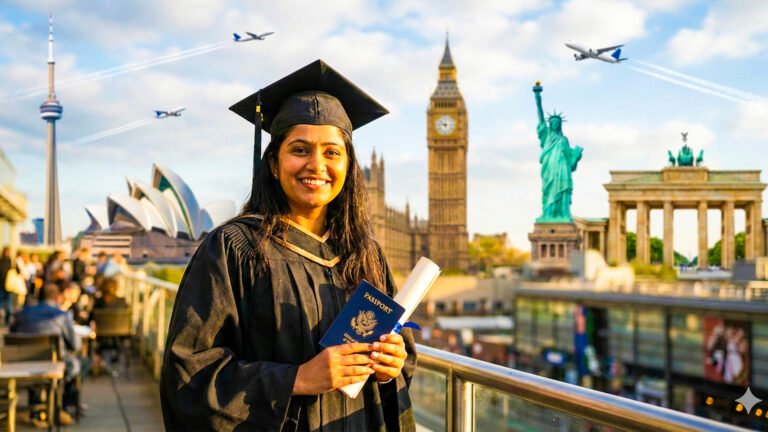Top 10 Shocking Visa Struggles for Indian Students Abroad
Top 10 Shocking Visa Struggles for Indian Students Abroad
Every year, thousands of Indian students dream of studying abroad, envisioning world-class education, global exposure, and promising career opportunities. However, the path to international education is often fraught with unexpected challenges, particularly when it comes to navigating the complex visa process. The student visa struggles for Indian students have become increasingly prominent, with many facing unexpected hurdles that can derail their academic aspirations.
In this comprehensive guide, we'll explore the top 10 shocking visa problems for Indian students abroad, providing insights into why these issues occur and how you can avoid them. Whether you're planning to study in the US, UK, Canada, Australia, or any other popular destination, understanding these common Indian students visa issues abroad is crucial for a successful application process.
Get Free CounsellingTable of Contents
- 1. Unexpected Financial Documentation Requirements
- 2. The Genuine Temporary Entrant (GTE) Requirement Challenge
- 3. Language Proficiency Test Score Discrepancies
- 4. Course Credibility and Institution Recognition Issues
- 5. The Intent to Return Home Dilemma
- 6. Health Insurance and Medical Examination Hurdles
- 7. Changing Immigration Policies Mid-Application
- 8. Biometric and Technical Glitches
- 9. Previous Travel History Complications
- 10. The Interview Anxiety and Preparation Gap
- Frequently Asked Questions
1. Unexpected Financial Documentation Requirements
One of the most common study abroad visa rejection reasons relates to financial documentation. Many Indian students underestimate the stringent requirements for proving financial stability. Consulates often demand evidence of sufficient funds to cover not just tuition fees but also living expenses for the entire duration of the course.
The visa process for Indian students requires meticulous financial planning. Applicants must provide bank statements spanning several months, proof of income sources, and sometimes even evidence of liquid assets. The shocking aspect is how minor discrepancies can lead to immediate rejection. For instance, sudden large deposits without proper explanation or inconsistent transaction patterns raise red flags for immigration officers.
According to U.S. Immigration and Customs Enforcement, financial documentation issues account for nearly 25% of all student visa rejections. This highlights the critical importance of proper financial planning when preparing your application.
To avoid these student visa struggles for Indian students, start preparing your financial documents at least 6-8 months before applying. Maintain consistent banking patterns and ensure all large transactions are properly documented. Consider consulting with financial experts who specialize in study abroad requirements.
Get Free Counselling2. The Genuine Temporary Entrant (GTE) Requirement Challenge
Countries like Australia have implemented the Genuine Temporary Entrant (GTE) requirement as part of their visa process for Indian students. This criterion assesses whether applicants genuinely intend to stay in the country temporarily for study purposes and return home afterward.
The shocking aspect of this requirement is how subjective it can be. Immigration officers evaluate various factors including your choice of course, educational background, economic circumstances in your home country, and immigration history. Many deserving candidates face rejection despite having all documentation in order simply because they fail to convincingly demonstrate their temporary intent.
As noted by the Australian Department of Home Affairs, the GTE requirement is designed to prevent the student visa program from being used as a pathway to permanent migration. This makes it crucial for applicants to carefully craft their statement of purpose and supporting documents to address this specific concern.
To navigate this challenging aspect of Indian students visa issues abroad, emphasize your strong ties to India, such as family connections, property ownership, or job prospects. Clearly articulate how your chosen course aligns with your career goals in India and provide evidence of your intention to return after studies.
Get Free Counselling3. Language Proficiency Test Score Discrepancies
Language proficiency tests like IELTS, TOEFL, or PTE are standard requirements for the visa process for Indian students. However, many applicants face unexpected challenges with score discrepancies or sudden changes in minimum requirements.
The shocking reality is that even minor differences in scores across test sections can raise concerns. For example, significantly higher writing scores compared to speaking might suggest potential fraud or coaching center manipulation. Additionally, some institutions suddenly change their score requirements after students have already taken tests, creating timing and financial pressures.
According to ETS (Educational Testing Service), test security measures have intensified in recent years due to increasing attempts at fraud. This has led to additional scrutiny of applications from regions with known issues, sometimes affecting genuine applicants.
To avoid these visa problems for Indian students abroad, take language proficiency tests well in advance of application deadlines. Aim for scores comfortably above minimum requirements and ensure consistency across all sections. If retaking tests, be prepared to explain significant score improvements convincingly.
Get Free Counselling4. Course Credibility and Institution Recognition Issues
Another significant challenge in the Top 10 Shocking Visa Struggles for Indian Students Abroad involves course selection and institution credibility. Immigration officials carefully assess whether your chosen program aligns with your academic background and career goals.
The shocking aspect is that even accredited institutions can raise red flags if the course selection seems inconsistent with your profile. For example, an engineering graduate applying for a hospitality management program without proper justification might face increased scrutiny. Similarly, institutions with high international student concentrations or those relatively new to accepting foreign students might trigger additional checks.
The British Council emphasizes the importance of choosing recognized institutions and credible programs to avoid complications in the visa process. They recommend verifying institution credentials through official channels before applying.
To mitigate these student visa struggles for Indian students, research your chosen institution thoroughly. Ensure it appears on official recognition lists and has a good track record with international students. Most importantly, clearly articulate in your application how your selected course builds upon your previous education and aligns with your future career plans.
Get Free CounsellingFrequently Asked Questions
What is the most common reason for Indian student visa rejections?
Financial documentation issues are among the most common reasons for visa rejections. This includes insufficient proof of funds, unexplained large deposits, or inability to demonstrate sustainable financial support throughout the study period.
How can I improve my chances of visa approval?
Start preparing early, maintain consistent and well-documented financial records, choose a credible institution and relevant course, score well in language proficiency tests, and clearly demonstrate your intent to return to India after studies.
Are there country-specific visa challenges for Indian students?
Yes, different countries have specific challenges. For example, the US focuses heavily on interview performance and intent to return, while Australia emphasizes the Genuine Temporary Entrant requirement. The UK scrutinizes financial documentation particularly carefully.
How long before my course should I apply for a student visa?
It's recommended to apply 3-6 months before your course start date. This allows sufficient time for processing and addressing any unexpected issues that may arise during the application process.
Can a previous visa rejection affect future applications?
Yes, previous rejections can impact future applications, especially if the reasons for rejection aren't adequately addressed. It's crucial to understand why a visa was denied and provide additional documentation or explanations in subsequent applications.
Conclusion
The journey to studying abroad is exciting but comes with its share of challenges, particularly when it comes to navigating the complex visa landscape. The Top 10 Shocking Visa Struggles for Indian Students Abroad highlighted in this article demonstrate the importance of thorough preparation and understanding of the process.
From financial documentation hurdles to the genuine temporary entrant requirement, these student visa struggles for Indian students can be daunting. However, with proper guidance, early preparation, and attention to detail, these obstacles can be successfully overcome.
Remember that each visa application is unique, and what works for one applicant might not work for another. The key is to approach the process with honesty, thoroughness, and patience. By understanding these common visa problems for Indian students abroad and preparing accordingly, you can significantly improve your chances of success.
If you're feeling overwhelmed by the visa process for Indian students or need personalized guidance, don't hesitate to seek professional assistance. Vibedu Study Abroad experts are here to help you navigate these challenges and make your international education dreams a reality.
Get Free Counselling








